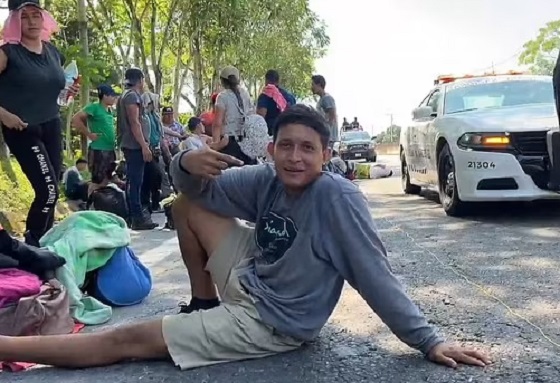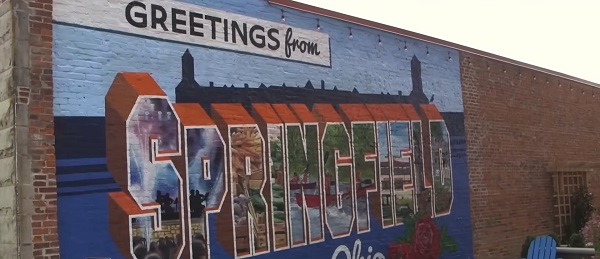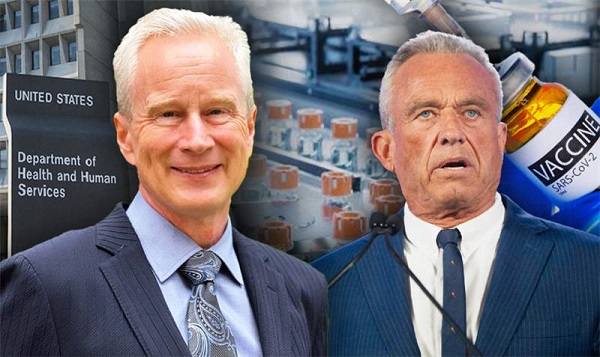illegal immigration
“We pray Trump doesn’t win”: 150,000 migrants in Mexico are rushing to the border before the election

From ToddBensman.com
By Todd Bensman as published by The Daily Mail
“I love Kamala Harris,’ a young Venezuelan man declared as he rested on the side of a highway in southern Mexico last week.
His belongings were heaped at his feet. Hundreds of fellow migrants stretched out along the roadway in both directions.
They’re headed for the U.S. and nearly all of them have an opinion about who should be America’s next president.
Donald Trump, no,’ the Venezuelan man said, shaking his head and dragging his thumb across his throat in a slicing motion.
He is one of thousands of migrants – from all over the world – joining a new rush traveling north from southern Mexico toward the U.S. border, less than two weeks before the presidential election.
I went to Tapachula in southwest Mexico near the border with Guatemala to investigate why they were on the move – again.
Throughout 2022 and 2023, massive caravans – some reportedly as large as 6,000-strong – became a common feature of the immigration crisis.
The mass migration became such a humanitarian and public relations disaster for the Biden-Harris Administration that U.S. Secretary of State Antony Blinken was dispatched to meet with Mexico’s president in December 2023 to demand that he impose stricter immigration controls.
And the pressure campaign worked.

‘I love Kamala Harris ,’ a young Venezuelan man declared as he rested on the side of a highway in southern Mexico last week. He is one of thousands of migrants – from all over the world – joining a new rush traveling north from southern Mexico toward the U.S. border, less than two weeks before the presidential election. (Above) Migrant caravan near Tapachula, Mexico on October 20, 2024
In January, I reported for DailyMail.com on Mexican police and military roundups near the U.S. border.
Migrants who made it to those northern provinces were detained and shipped hundreds of miles back south to cities like Tapachula in the southwest or Villahermosa near the gulf.
The Mexican media called it ‘Operation Carousel.’
And for nearly 10 months, the caravans stopped.
But now, they’re back on.
The migrants I spoke to on the road this week believe that this may be their last chance.
Many of them hope to reach the U.S. before November 5 because they fear that, if Trump is re-elected, he’ll close the southern border and enforce longstanding immigration laws.
‘If [Trump] wins… one has to do what the government says, [wait] for my turn,’ said Carlos, a Honduran man in a caravan 30 miles north of Tapachula.
In reality, it’s unlikely that these migrants will be able to make the 1,300-mile trek in the next two weeks. But they can try.
And there’s another more complicated reason that the caravans have started back up: The Mexican government is encouraging them.
The caravans that I traveled with were escorted by Mexican National Guard escorts, something that I have witnessed. Perhaps, it not only the migrants growing restless, so, too, are the authorities.
For months, an estimated 150,000 U.S.-bound migrants have been bottled up in increasingly dire conditions in Tapachula, as ever more arrive there from South and Central America.
In fact, the true number massing in southern Mexico may even be in the hundreds of thousands.
I’ve visited Tapachula at least five times over the last decade and I’ve never seen it so crowded. All the hotels and motels are packed. Immigrant shelters are at full capacity.
Those who cannot afford accommodations – including women and children – sleep on the streets and in city parks, packed in like sardines.
Remember this as you hear Vice President Kamala Harris tout new statistics showing a precipitous decline in the number of illegal U.S. border crossings in 2024.
She attributes the positive change to the recent enforcement of U.S. asylum laws. But that’s not the full story.
Even the Department of Homeland Security admitted earlier this month that the drop in illegal US border crossings is due, in part, to, ‘increased Mexican enforcement efforts.’
Indeed, at the White House’s behest, Mexico has been containing these people for months in southern cities like Tapachula and Villahermosa, which have come to resemble sprawling, open-air refugee camps.
Now the situation is becoming untenable.
According to those I’ve spoken to, the Mexican government’s promises to provide travel documents to the migrants have never materialized.
In an apparent recognition of the overcrowding, the U.S. government is now building a new migration processing facility in Tapachula.
Meanwhile, the Mexican government is starting to transfer migrants out of Tapachula into surrounding cities to relieve the growing pressure.
And, the coming election is only heightening tensions.
Incredible drone shows large caravan migrants heading to the US
A group of Ghanaian men in a congested park in Tapachula told me that they feared a Trump presidency.
‘We do not like Donald Trump, because he don’t like us,’ one man said.
To him, Kamala Harris is the preferred option.
Another Ghanian man said he plans to wait for the results of the election, before making his next move: ‘If after election day [Harris is elected], we know that everything is good, then we can enter.’

A group of Ghanaian men in a congested park in Tapachula told me that they feared a Trump presidency. ‘We do not like Donald Trump, because he don’t like us,’ one man said. To him, Kamala Harris is the preferred option.
A middle-aged Venezuelan man also in the park reiterated those fears: ‘We know that if Donald Trump wins, all the migrants will be kicked out the [United States]… we hope that he doesn’t win.’
It is still unclear how far north these migrant caravans will get before America votes – and I suspect that many migrants only wish to escape Tapachula.
But, certainly, it seems likely that after November 5 – Mexico’s newly-elected president will consider her country’s part in ‘Operation Carousel’ to be complete and lift any remaining immigration controls.
That would mean hundreds of thousands of migrants, who have been waiting out the U.S. election in Mexico, may be permitted to – once again – try their luck at crossing illegally into the U.S.
As far as they’re concerned, a Kamala Harris presidency would mean that America’s borders will be thrown open.
If Donald Trump is elected president, their plans may change.
Daily Caller
Los Angeles Passes ‘Sanctuary City’ Ordinance In Wake Of Trump’s Deportation Plan

 From the Daily Caller News Foundation
From the Daily Caller News Foundation
The Los Angeles City Council approved an ordinance Tuesday designating the city as a “sanctuary city” following President-elect Donald Trump’s mass deportation plan.
This measure prevents the use of local resources for immigration enforcement and prohibits city agencies from sharing information about undocumented residents with federal immigration authorities, according to The Associated Press. The council voted unanimously, aligning Los Angeles with numerous cities across the U.S. that have adopted similar policies.
The ordinance will undergo a second council vote for procedural reasons as Mayor Karen Bass, who has expressed support for the initiative, holds veto power but is unlikely to use it, AP reported. Councilmember Hugo Soto-Martinez pointed out the city’s firm stance against cooperating with Immigration and Customs Enforcement (ICE).
🚨 President-Elect Trump has named Tom Homan as Border Czar. pic.twitter.com/XNfp4to0Ev
— Daily Caller (@DailyCaller) November 11, 2024
“We’re going to send a very clear message that the city of Los Angeles will not cooperate with ICE in any way,” Soto-Martinez said. “We want people to feel protected and be able to have faith in their government and that women can report domestic violence crimes.”
Soto-Martinez also noted that many immigrants without legal status are integral to the community, working in roles such as housekeepers, nannies, and cooks, AP reported. While the ordinance highlights the city’s values, critics argue that Los Angeles already refrains from cooperating with federal immigration agencies, suggesting the policy may not bring significant operational changes.
Trump announced that former acting ICE Director Tom Homan will take on the role of border czar in his upcoming administration. Homan will oversee border operations, including deportations, security at land and sea entry points, and aviation safety measures.
Trump revealed Monday that he plans to declare a national emergency and deploy military resources to execute his mass deportation agenda. He confirmed reports from Judicial Watch’s Tom Fitton, who claimed the administration is ready to use emergency powers to address what he called the “Biden invasion.”
Daily Caller
“I know three families that have gone to Canada.”: Locals Say Haitians Are Hoofing It Out Of Springfield After Trump Win

 From the Daily Caller News Foundation
From the Daily Caller News Foundation
‘They Are Afraid’
Haitians living in Springfield, Ohio appear to be fleeing the city in droves after President-elect Donald Trump was declared the winner of the election, according to reports from locals.
The national spotlight shined on Springfield, a city of roughly 60,000 residents nestled in central Ohio, for weeks following unverified viral online claims that Haitians migrants had been spotted butchering a pet for consumption. The subsequent uproar about Springfield sparked further media debate about mass migration and its consequences, as Springfield has been dealing with an influx of Haitian migrants in a relatively short amount of time.
“The traffic situation seems to be better now,” longtime resident Barron Seelig said to the Daily Caller News Foundation, referring to widespread accounts from city residents in past months that Haitian drivers are causing mayhem on the roads.
While Seelig did speak about local rumors of impending Immigration and Customs Enforcement (ICE) raids possibly scaring Haitians away, he also mentioned recent crackdowns by highway patrol officers and added that some migrants are leaving because they don’t enjoy the Ohio winters. Another Springfield local told the DCNF that he heard it was virtually impossible to rent a U-Haul truck because so many Haitians are currently renting them — presumably to leave town.
Those who provide services to immigrant services in the city have also said that Trump’s election victory has prompted Haitians to flee en masse.
“Some folks don’t have credit cards or access to the internet, and they want to buy a bus ticket or a plane ticket, so we help them book a flight,” Margery Koveleski, who helps Haitian migrants manage government bureaucracy, told The Guardian. “People are leaving.”
“People are fully aware of the election result, and that is why they are leaving; they are afraid of a mass deportation” Jason Payen, a co-founder of the Haitian Community Alliance, said to the Guardian.
“Several of my customers have left. One guy with his family went to New Jersey; others have gone to Boston,” Payen continued. “I know three families that have gone to Canada.”
Trump, for his part, has vowed to embark on a border enforcement agenda that will apply to the entire country.
During the campaign, Trump pledged to continue building the U.S.-Mexico border wall, revive the Remain in Mexico program, hire more border patrol agents and conduct the “largest deportation program in American history,” and end birthright citizenship for those born on U.S. soil to illegal migrant parents.
Trump said in October that he would revoke Temporary Protected Status (TPS) for Haitian nationals and “bring them back” to the country. The Biden-Harris administration has provided TPS — which temporarily gives deportation protections to its designees — to hundreds of thousands of Haitian nationals currently living in the U.S.
-

 Business1 day ago
Business1 day agoCarbon tax bureaucracy costs taxpayers $800 million
-

 Brownstone Institute1 day ago
Brownstone Institute1 day agoThe Most Devastating Report So Far
-

 ESG19 hours ago
ESG19 hours agoCan’t afford Rent? Groceries for your kids? Trudeau says suck it up and pay the tax!
-

 Daily Caller18 hours ago
Daily Caller18 hours agoLos Angeles Passes ‘Sanctuary City’ Ordinance In Wake Of Trump’s Deportation Plan
-

 John Stossel17 hours ago
John Stossel17 hours agoGreen Energy Needs Minerals, Yet America Blocks New Mines
-

 COVID-191 day ago
COVID-191 day agoDr. McCullough praises RFK Jr., urges him to pull COVID shots from the market
-

 Business2 days ago
Business2 days agoOttawa’s avalanche of spending hasn’t helped First Nations
-

 MAiD1 day ago
MAiD1 day agoOver 40% of people euthanized in Ontario lived in poorest parts of the province: government data







